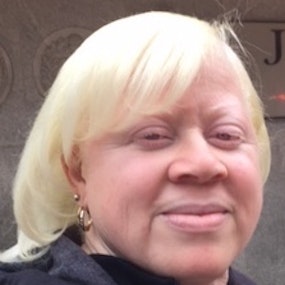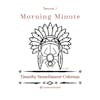


The Colors of Sound Podcast, Season 2, Ep7
The Shelia Graham Interview
Recorded Summer 2023
Join us for our latest episode where the talented Ms. Shelia Graham speaks on her years as an educator in the New York City Public School system, as well as her lifelong quest to help educate the global community about issues related to being a person that happens to have Albanism.
#TakeBackMonday, #Purpose, #Service, #Community, #People, #InnerCircle, #QuoteOfTheDay, #community-service, #bronx, #smallbusiness, #newyork, #black, #positivevibes, #learning, #workshop, #intergenerational, #podcasting, #LiveBrave, #intergenerationalprogramming, #technology, #LifeLearner, #ColemanGlobal
--- Send in a voice message: https://podcasters.spotify.com/pod/show/wdon1204/message Support this podcast: https://podcasters.spotify.com/pod/show/wdon1204/support
In a world where so many things are vying for your time, I just wanted to say, Thank You for your attention.
In Unity,
Timothy
Timothy Coleman (00:09.91)
Hey everybody, it's Timothy Stone Dancer Coleman coming to you from the Colors of Sound podcast that you can hear, of course, on our own podcast station, WDON1204.com. Our mission with the Colors of Sound podcast is to create a safe space for people worldwide to share their unique stories.
Sharing her story with us today is an amazing person that I actually had an opportunity to get to know because we took a media class together a couple of years back, and she has grown and blossomed and done some amazing things, and I really think she's a unique individual, and I am so excited for you to get to know Ms. Shelia Graham.
Everybody, can we say hey, Ms. Shelia? All right, so Shelia, how are you doing today? Timothy, I am feeling absolutely great today. How are you? I'm doing great. Thank you so much for joining us, to get over here and I really appreciate that you took time out to come and share your story with our listeners. Yeah, it is my pleasure. So in our conversation today, I wanna touch on a couple of specific things because I want people to get to know you. And so the first thing I would say, people sometimes approach this in a reverse kind of way. This is sometimes the last question that people ask. So
this question first. What is the one takeaway before people know anything about you what is that one takeaway that you hope people receive from you know in our audience from hearing from you today and sharing your story? I think that one takeaway for me would be don't ever judge people by how you see them. There's
Timothy Coleman (02:09.824)
breathing, growing, doing wonderful things inside of the skin that God brought us here in. So I think that's the biggest takeaway. I love that.
Do you feel like you found your purpose in life? Do you feel like your purpose changes throughout life? How do you view the word purpose? So the word purpose for me is kind of transformative and by that I mean I believe that God put us here for purpose in a specific space and time, right? To do wonderful things for the people that we encounter in that particular space and time. So for me,
my career I was many people and held many positions. So while I was in those positions I served the purpose that I believe God put me there for and now that I am transitioning to do other things I believe that I will serve the purpose that He will put me there for and touch the lives of people that I encounter. So purpose to me it's always evolving. I love that. So a
And that just kind of came up. I read somewhere that, and I do agree with this statement, like let me say that before I say this statement, is that there's a difference between planning and preparing. When you plan for something, it's more seen like you're taking something into your own control, which if it doesn't go the way you planned for it to go, that might bring frustration,
of self-loathing, like you get angry that you didn't reach this particular plan by this particular time. As to where preparing means that you're giving it back over to God, you're giving it back over and saying, you know what, whenever you see fit for this to happen, I'm gonna be ready for it, right? How do you feel about that? Please excuse me.
Timothy Coleman (04:16.962)
Funny you should say that because we can make all the plans that we want in life and have every intention of going through with all of those plans. But if those plans don't necessarily align.
with what God's purpose is for you, those plans are gonna go sideways, left, right, until you get back on the purpose and plan that God has for you. I'll give you a perfect example using my own life, if that's okay. Absolutely. My bachelor's degree is in computer programming with a master's in business management. My goal in life was to be a computer programmer and rule the world. Huh, God had us. God's probably laughing at me today for that one.
And when I graduated and looked for a computer programming position, it was a very male-dominated field. You didn't see too many minorities in that field at the time. There were no blacks. There probably weren't any females, and definitely none that looked like me. So I never was able to obtain a position in the computer programming world. And what ended up happening was a friend of mine said, hey, why don't you be a teacher?
was I don't want to be a teacher. You know, I want to be a computer programmer. That's what I planned. And long story short, I took his advice and I went and I became a teacher and it was the best thing, the best thing that ever happened to me because I discovered I like teaching. I like little people. I like my colleagues. So I didn't plan on that. I literally had to go back to school and get the,
prepare to be a teacher.
Timothy Coleman (06:06.122)
So my plan and preparation took two totally different paths, but they eventually came together to serve God's purpose. Amen. So then what are you doing now? What are some of the things that you're working on in this season of your purpose? In this season of my purpose, I'm actually transitioning. I was with the Department of Education for 34 years. I served in many positions during those 34 years.
Now I'm retired and I'm looking for my next purpose. I am planning to start a television show. Planning, I'm working, it's the process, it's coming along because this is not something that I, again, went to school for, right? So not something I plan for, it's something that kind of surfaced in me. And I can't do this on my own, and I know that me sitting
around going, hey, I want to start a television show, is not me. Right? I know that's something that God is probably instilling in me and developing in me so that my show will be a service to community and a service to other people and serve a purpose according to what God has intended. That's great. That's great. Well, I definitely hope that
you are able to get your idea expressed in the way that you.
are preparing, right? Because we need more quality content that is from the community. We need more messages of hope. We need more messages that represent us as the BIPOC community. I'm doing some sessions of this podcast with a group of older adults. And we've been going over different types of conversations and one of the big conversations
Timothy Coleman (08:08.62)
we had a couple of weeks ago was about people judging you based on what they believe. And people, you know, in general in the world, wanting to put other people inside of a box because it makes them feel more comfortable in how they can interact with you. Right? So one of the things that I know about you that our listeners obviously won't be able to tell is that you're Albanese. Right? Am I saying it correctly?
individual with albinism. There we go. And albino. All right, so now, is it correct to say albino? It's correct to say albino. It's correct to say she was born with albinism. Okay, okay. So educate those who may not know what that is and what some of the things are that you face as a human being who just so happens
to be in that category? So it's usually shocking when people see individuals with albinism. For myself, I am what they call a pure individual with albinism, and what that means is my hair is platinum blonde. My skin is crystal clear, I mean white, right? I can't use another color. A lot of people like to say beige or pink.
I find those colors offensive. So it's just being conscious of that if anyone ever runs into anyone with albinism.
be mindful. And there are some visual limitations that comes with it in some individuals and also some hearing limitations that some individuals could have. However, with all of those limitations or impairments as society likes to label, we are some very successful people. We are very determined people. We have not run into an individual with albinism yet that has not
Timothy Coleman (10:18.748)
they have to do everything that everyone else can do because the perception is that we will never be able to because of the limitations visually and hearing wise. There are some individuals with albinism who do have some pigment in their skin and their skin tones and eye colors are a lot darker or a tint darker and some may have melanoma right which means their skin is transitioning.
may have, you know, been born with the brown skin and it's trigalbinism is coming through and you'll start to see white splotches on their skin. So it varies and as far as perceptions, people just need to be sensitive to the fact that, hey, you might see someone who is pure white and in many cases, I hate to say this to you Timothy, but there's still a level of ignorance that exists in the world where because you see white, you perceive white.
and you understand white. But if you see me and you speak to me, you will clearly hear in my tone that I am an African-American woman. Right? But in some instances, unfortunately Caucasian people will perceive me as white. Black people, my own people, will perceive me as white and it presents kind of some uncomfortable situations just moving around sometimes. You know, because they're not accustomed
seeing someone like me. So I first want to say thank you so much for being so loving and compassionate in how you just described your experience. I believe that at every moment, and I know as an educator you feel the same, that every moment is a teachable moment. Absolutely. And I think even if we look at this from a wider perspective, I love what you said.
you perceive white, right? There are a lot of times when I'm on the phone with someone and they perceive me as being a white person because of how I speak. Or they wouldn't naturally think or place me in the category of African American. And then when I show up in person, they're still looking for the voice that they heard over the phone. I'm like, yeah, it's me, I'm the one. Trust me, I know how you feel about that. Right, so I mean, there are so many ways
Timothy Coleman (12:47.988)
that we judge one another that puts a blanket over the conversational opportunity that you could be having with someone, right? And I'll say even one step further, whatever I, as a human being, think towards someone else, it doesn't stop them from their purpose. It doesn't put a blanket over their potential, but it does limit me in how I'm able to receive them and their fullness.
That's a very sad situation too, right? Because you prejudged me based on my tone of voice or my skin color, right? You missed that opportunity to have that conversation that will inform you or educate you. And I always tell people there is no limit to the amount of questions that should be asked if you want to know something. There's no limit to research and access to research.
on our phones, walking around, that we can find out and get answers to questions, right? So I used to tell my students, listen, if you want to know something, simply ask. The worst thing a person could tell you is they don't know. Right?
But that's an opportunity to you to say to them, I think we can find out together. Yes. So that child never feels like there's a question that cannot be answered, because that's the purpose for educating. We have to educate our children. And they ask questions. The worst thing is for an adult who doesn't ask questions but prejudge. If I can, I'll give you an example when I'm out with friends and family.
white girl perceived amongst all of my black family and friends. And certain people will stare and act like I don't belong in that group. And all I want to say to those people is,
Timothy Coleman (14:56.75)
Please stop staring, that's number one. Please, please, you wouldn't want to be on the receiving end of that. Two, ask a question. Most likely, I am the type of person, if you stop me in the street and you say, please tell me.
Are you an individual with albinism? I will gladly answer the question, yes. Right? Because I'd rather you walk around informed than walk around with that level of unawareness. So taught, so I mean it seems like, how you presented is simple. It seems like there would be a lot of fear in stepping into the ring and admitting what you don't know. I mean this is the whole point of education, right?
and removing the fear of learning and understanding, which many of our schools are in jeopardy of right now because of all the books being taken out and history being rewritten in so many different ways and with such a specific perspective. What do we do? First of all, stop. Stop.
You can't erase history that has happened. You can't replace it. It's there. Stop trying to determine every.
page and word on a book in a book that a child reads. It's unfair to the children. If we want our children to be well informed and well prepared to be the next leaders, then they have to have access to that information. We want to give them access to everything that they should not have access to, but instead of giving them access to the things that will mean the most in helping them to be successful,
Timothy Coleman (16:50.928)
goal-oriented leaders in their community? Why would you take that literature away and that opportunity away from children? That's right. You're trying to reshape this nation. You can't reshape something that's existed for over 200 years. You seem like an extremely passionate educator. I can't imagine how much fun it was to have been in your class. My kids were spoiled rotten, that's all I have to say. They were well educated and spoiled rotten.
And even some of the teachers that I later got an opportunity to train, right, they had a whole different perspective just by being in some of my learning environments, you know, coming in and observing what I'm doing in my classroom, and then let's have a conversation about it, let's take it to the next level. Let me come into your classroom, and let me script your classroom, you know, your teaching, and let me show you in black and white what's happening in your classroom, right? Having some of those experiences like,
teachers, right? Because I'm just using what you give me. And that's what we want our students to know. We want them to use what we give them. So we give them the best. That's right. That's right. I love it. I love it. So, obviously, they're, you know, working with the community.
Youth and adults, right, is a passion of yours. Absolutely. And you are going to heighten and expand that, that passion by putting it on television. That's my goal. Do we know how soon we can expect to start to see your show? I'm anticipating November or shortly after the new year. Okay, beautiful. Yes. And, you know, the folks listening, you know, you're gonna be able to see
and transcript of this podcast, all of Shelia's contact information. If you wanna get in touch with her, if you wanna be a guest on her show, find out more about it. We've got links that we're gonna be sharing. Please check those out. Again, I had a chance to work alongside of Shelia as we were both in the position of student and learning. Learning together. Yeah, that's exactly right, and supporting one another in that television space and making sure that
Timothy Coleman (19:11.888)
of us had what we needed and you know one day you were taking notes the next day I take notes and we're sharing. Yes, I'm still using those notes. Thank you very much. That's right. That's exactly right. You take amazing notes. So I just want to thank you for coming on to the podcast today and joining us with the colors of sound. I think you gave us some really good things to think about. I think you know one of the takeaways for me for our audience would be never be afraid to keep
something doesn't make you weak or inferior to someone else it only breeds time and opportunity for a great conversation and a deeper level of learning and I would say you know you've got everything you need in your phone these days that's what's also was very different than certain generations because we only have that you know in an encyclopedia set right and you hope your parents had them at home if they could afford it because those were very
Right, and with as quickly as information changes, I don't know if encyclopedias and printed form even serve the same purpose as they once did, but everyone has the opportunity to look things up online and educate yourself so that the second time you come across a situation or a conversation, you are more informed than you were the first time it came up. Absolutely. All right, thank you so much Shelia. Do you have any final thoughts?
would like to share? First of all, Timothy, thank you for having me. It's been a pleasure being here with you today and sharing my story. I'm sure you scratched the surface of it. If you ever need me to come back and continue this conversation, just let me know. I'm willing to do that. I love that. And my final thought is always remember that the God we serve is also the same God that created you and
you need to survive every single day.
Timothy Coleman (21:19.374)
We always have everything we need right now. Thank you so much everybody for joining us. We'll see you next time here on the Colors of Sound podcast. Once again, you can find us online at WDON1204.com and on all of our socials, we are at Coleman Global. Have a great day everyone. ["Colors of Sound"] Yay.

Shelia Graham
Retired Educator
Shelia Graham was born in North Carolina during a time when the south was in the midst of racial discrimination battles, the slow demise of segregation and Dr. Martin Luther King Jr.’s famous “I Have A Dream” speech. Under such conditions, imagine a well kept little black girl with blonde hair, an indescribable eye color and pristine white skin growing up with her very loving black family. In those times, perceptions, and limited understanding lead people to believe that this child surely belonged to a white family. However, her very strong, determined parents and grandparents were having no such thing. She might look different; but the expectations of getting a high school diploma were the same.
At an early age, Shelia became determined to do more than what was expected simply because others said she probably would never be able to due to her visual impairment. Excelling in school, she earned a high school diploma and later graduated from Herbert H. Lehman College with a Bachelor’s Degree in Computing and Management. Degree in hand, she set out to find a job as a computer programmer in a male-dominated field. With reality settling in, Shelia shifted her aspirations to education, where she began her career as a Computer Teacher which allowed her to utilize her computer programming knowledge. After teaching for one year, Shelia discovered that teaching was a lot of fun. She returned to Lehman College and earned a Master’s of Science Degree in Early Childhood Education. Over the years, not only did she demonstrate her abilities to educate children as a classroom … Read More
Featured Episodes
Check out the latest podcast episodes from our channel.






















